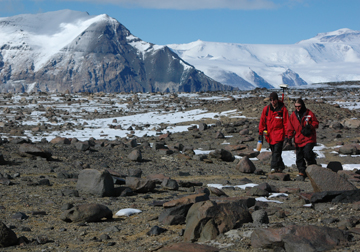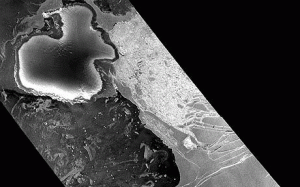Antarctica
-
‘Ice People’ is packed with plenty of ice, not so many people
Antarctica is warming rapidly, climate scientists report, upsetting fragile ecosystems and threatening the world with a significant rise in sea-levels. With the largely uninhabited and frozen continent melting before humanity’s very eyes, what better time to roll out a new documentary about the coldest, driest and windiest place on Earth. Billed as a journey to […]
-
A few (green) minutes with Andy Rooney…
The old codger has been haunting my Sunday evenings for more than three decades. When I was a kid, “60 Minutes” opinionator Andy Rooney was kinda entertaining; his “common sense” rants about the stupidity of daily life appealed to my pre-pubescent world view. And as I got older, it was still fun to watch the […]
-
Q: How much can West Antarctica plausibly contribute to sea-level rise by 2100?
U.K. Telegraph: “Antarctic ice bridge collapse hailed as new sign of global warming.” A. 3 to 5 feet — contributing to an increasingly likely total sea-level rise of more than 5 feet by 2100, a rise that will be all but impossible to stop if we don’t sharply reverse CO2 emissions trends within a decade […]
-
Sea levels to surge at least a metre by 2100, scientists warn at Copenhagen meeting
COPENHAGEN — Months before make-or-break climate negotiations, a conclave of scientists warned Tuesday that the impact of global warming was accelerating beyond a forecast made by U.N. experts two years ago. Sea levels this century may rise several times higher than predictions made in 2007 that form the scientific foundation for policymakers today, the meeting […]
-
Scientists find bigger than expected polar ice melt
GENEVA — Icecaps around the North and South Poles are melting faster and in a more widespread manner than expected, raising sea levels and fuelling climate change, a major scientific survey showed Wednesday. The International Polar Year survey found that warming in the Antarctic is “much more widespread than was thought,” while Arctic sea ice […]
-
West Antarctic ice-sheet collapse means more catastrophe for U.S. coasts
The fate of Florida and Louisiana if we're myopic and greedy enough to let the West Antarctic Ice Sheet collapse (click to see entire SE coast).
A new study in Science finds that sea-level rise from a collapse of the WAIS would likely be 25 percent higher for North America than previously estimated:
The catastrophic increase in sea level, already projected to average between 16 and 17 feet around the world, would be almost 21 feet in such places as Washington, D.C., scientists say, putting it largely underwater. Many coastal areas would be devastated. Much of Southern Florida would disappear.
This article has already started to make news around the globe (Reuters story here). But, frankly, divining the difference between a rise of 16.5 feet (an incalculably devastating catastrophe) and 21 feet (an incalculably devastating catastrophe) is like trying to count the number of devils on a pin.
Nonetheless, WAIS collapse is all but inevitable given business-as-usual warming of 5-7°C. As I explained in my book:
Perhaps the most important, and worrisome, fact about the WAIS is that it is fundamentally far less stable than the Greenland ice sheet because most of it is grounded far below sea level.
For a longer discussion of WAIS and its unique instability, see "Antarctica has warmed significantly over past 50 years."
So what is new in the Science article, "The Sea-Level Fingerprint of West Antarctic Collapse" ($ub. req'd)? Study coauthor and geophysicist Jerry X. Mitrovica, director of the Earth System Evolution Program at the Canadian Institute for Advanced Research, explains:
-
Poll shows more Americans do not believe global warming is result of man-made activity
Amidst the chaos of the Inauguration events and Obama administration's transition, Rasmussen Reports conducted a global warming poll late last week. As I perused through the poll questions and responses I could barely believe what was reported: An increasing number of people do not think global warming is caused by human activity.
According to the poll, 44 percent of all people polled thought long-term planetary trends were the primary cause of global warming as opposed to the 41 percent of people who blamed human activity. In 2006, only 35 percent of people believed that global warming was caused by planetary trends. Overall, 41 percent of people polled stated global warming was a very serious problem, and 23 percent of people polled thought that it was a somewhat serious problem. Interesting though, according to Rasmussen Reports, 64 percent of Democrats think global warming is a serious problem while only 18 percent of Republicans believe the same.
Affiliations aside, this news is not only disheartening, but it is also downright disturbing.
-
Nature: Antarctica has warmed significantly over past 50 years
The rest of the media is finally catching up to my post from last month.
That's because Nature published the peer-reviewed paper that was first reported at the American Geophysical Union meeting and Nature's own blog (!), "Warming of the Antarctic ice-sheet surface since the 1957 International Geophysical Year" ($ub. req'd, abstract below).
Scientists know the Antarctic ice sheet is losing mass "100 years ahead of schedule."
It is really only the warming of the West Antarctic Ice Sheet that you should worry about (at least for this century) because it's going to disintegrate long before the East Antarctic Ice Sheet does -- since WAIS appears to be melting from underneath (i.e. the water is warming, too), and since, as I wrote in the "high water" part of my book, the WAIS is inherently less stable:
-
Evidence that Antarctica has warmed significantly over past 50 years
Scientists know the Antarctic ice sheet is losing mass “100 years ahead of schedule” (see here and here). Now, as Nature‘s climate blog reports, two studies presented last week at the AGU meeting document what should not be a surprise, but still is. New research suggests “the entire Antarctic continent may have warmed significantly over […]




